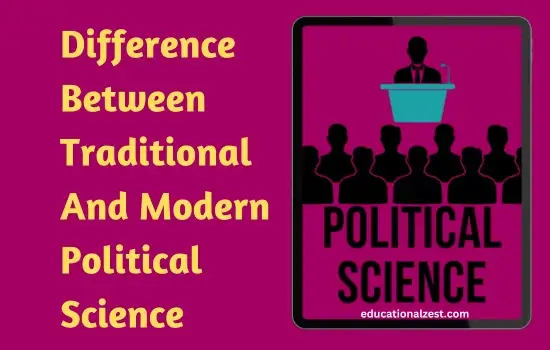The subject of Political science is not only limited to the bookish theories, but also in the practical fields. Be it the process of governance or about sitting as the opposition, or about practicing the democratic rights and analyzing the Government policies in respect to methods, social and economic view, everywhere the practical use of political science happens to be practiced. When it comes to modern political science, such methods are utilized there. Here we will be analyzing the differences of the traditional and modern political science from 5 aspects. Keep reading.

1. Focus and Scope:
Traditional Political Science:
Traditional political science emphasizes history, institutions, and ideas. Common topics include Plato, Aristotle, Machiavelli, and Rousseau. These texts and people illuminate political thought and governance throughout history. Traditional political science studies governance, statecraft, and power relations in political institutions. Current political science has additional methodologies and topics. Statistics, case studies, and comparative politics are used. Modern political science examines globalization, human rights, environmental policy, and international relations. Complex political events are analyzed from economic, social, psychological, and anthropological viewpoints.
Modern Political Science:
Modern political science is increasingly diverse and reflects evolving political studies and complicated global issues. Comparative politics, international relations, public administration, political economics, and political theory are among its numerous subfields that provide light on politics and governance. Modern political scientists use numerous methodologies to study politics. Statistical analysis and survey research may study political behavior, public opinion, and policy outcomes. Case studies, interviews, and ethnography highlight complex political and social processes. Economics, sociology, and psychology are used in modern political science to understand the interdependence of political, economic, social, and psychological factors in human behavior and decision-making.
2. Methodology:
Traditional Political Science:
Textual analysis, historical research, and philosophical reasoning are used in classical political science. It explains politics using theoretical frameworks and conceptual models. Traditional academics study old writings and theories. Textual analysis seeks meaning and themes in political writings, speeches, and documents. History contextualizes political events and developments and follows political ideas and institutions. Philosophical reasoning analyzes political, power, and justice issues utilizing ancient and current philosophical traditions.
Modern Political Science:
Researching political problems using qualitative and quantitative methodologies has expanded political science. Political science uses statistical analysis, surveys, experiments, and case studies. The empirical turn allows researchers to test hypotheses, obtain new knowledge, and provide evidence-based policy recommendations. Quantitative methods like statistical analysis and surveys may reveal political behavior and patterns in large datasets. Research may study causal links and policy changes using experiments. Politically affected individuals and communities express their perspectives via interviews, focus groups, and ethnography.
3. Theoretical Perspectives:
Traditional Political Science:
Traditional political science study large concepts and normative frameworks for ideal governance and society. Plato and Aristotle established normative political philosophy by studying justice, authority, and the ideal society. Traditional political analysis stresses ethics and philosophy. These normative frameworks evaluate political systems and institutions and propose reforms for greater governance and societal justice. Traditionalists address obligation, authority, power, and resource distribution.
Modern Political Science:
Modern political science includes rational choice theory, behavioralism, constructivism, and post-structuralism. Modern political theories explain political players, institutions, and policies. These theories use facts to describe political processes. Modern political science uses numerous theoretical and empirical methodologies to study politics and governance in modern civilizations. It reveals power, conflict, and collaborative dynamics to guide policy and research.
4. Interdisciplinary:
Traditional Political Science:
Traditional political science is less diverse and emphasizes theory and history. Scholars examine Plato, Aristotle, and Machiavelli. Traditional political scientists choose political science books above philosophy or sociology. This restricted approach may overlook insights from other areas that might increase political understanding. Traditional political science may neglect transdisciplinary concepts and approaches that illuminate complex political circumstances by concentrating on the discipline.
Modern Political Science:
Modern political science uses interdisciplinary methodologies because complicated events need multiple perspectives. Contemporary political scientists collaborate with economists, psychologists, environmentalists, and data scientists to address climate change, globalization, and inequality. Collaboration broadens political science’s analytical tools and perspectives. Economics specialists utilize quantitative analysis and modeling to understand how economic factors impact politics and policy. Psychologists study individual and group behavior to understand political ideas and decisions. Environmental scientists study how policies influence ecosystems and people, enriching sustainability and resource management conversations. Modern computer tools let data scientists identify political patterns and trends in vast datasets.
5. Relevance and Application:
Traditional Political Science:
Traditional political science explains governance and power. This paradigm helps examine political systems, ideologies, and history. Plato, Aristotle, and Machiavelli illuminate political phenomena’ eternal principles and patterns in traditional political science. Traditional political science examines political thought and institutions across time. Historical context and political principles help scholars understand current politics. Traditional methods demonstrate that justice, democracy, and sovereignty remain important, providing a framework for judging political systems. Traditional political science’s canonical books and historical background may limit its applicability to present issues. Classical concepts and historical insights may elucidate political processes, but they may not address complex social concerns. New issues that need transdisciplinary and innovative approaches may be ignored by traditional political science.
Modern Political Science:
Modern political science may cover globalization, democracy, human rights, and sustainability. Interdisciplinary methods provide evidence-based policy solutions and broader political understanding. Modern political scientists research and solve issues using economics, sociology, psychology, environmental studies, and data science. Economists examine economic factors impacting political behavior and policy outcomes, whereas psychologists investigate individual and group behavior to inform political ideas and decisions. Environmental scientists study how policies influence ecosystems and people, enriching sustainability and resource management conversations. Modern computer tools let data scientists identify political patterns and trends in vast datasets.
Conclusion
When it comes to the building of the nation, making proper use of both traditional and modern political science happens to be essential. Understanding and welcoming all these philosophies is most essential here and the academics and political leaders make use of the same. The mix and match of the perspectives is quite important here.
